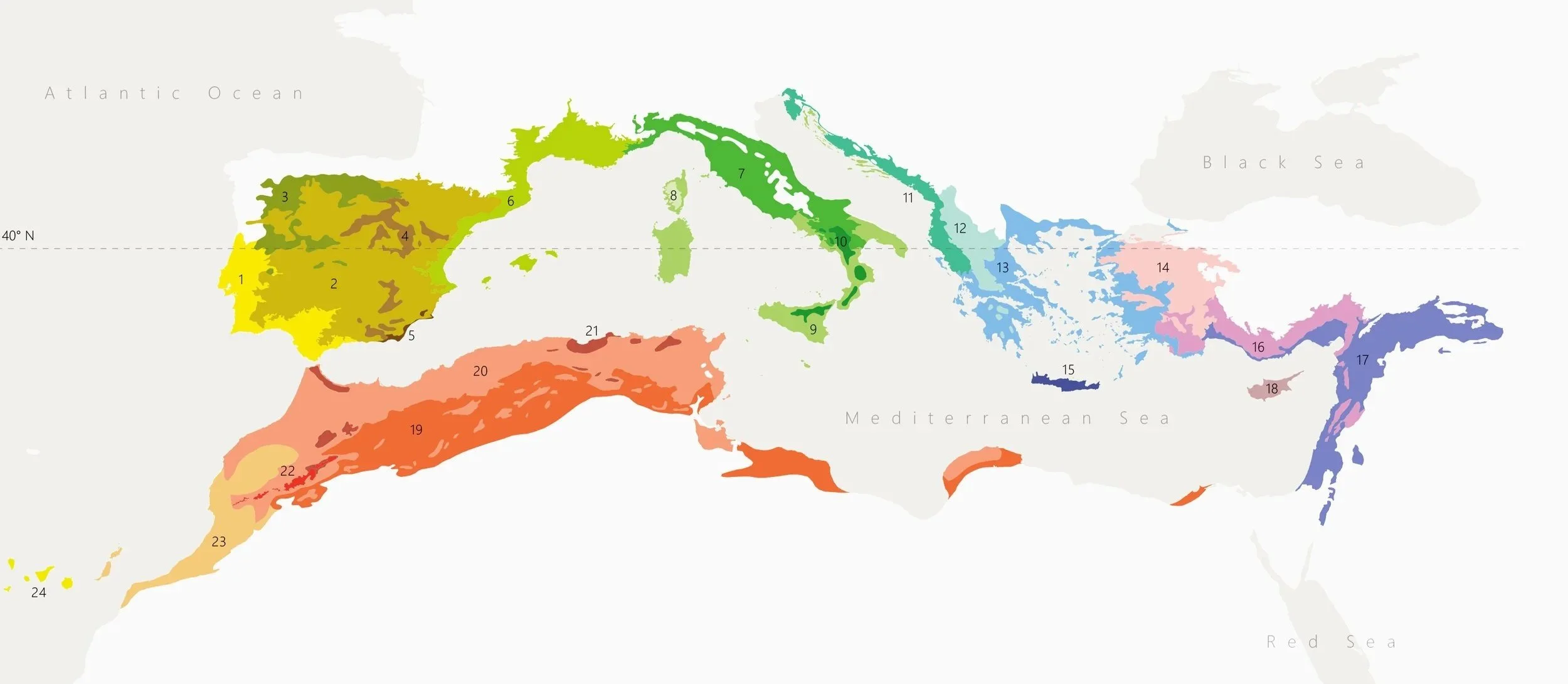Regenerative Landscape Design within a Mediterranean Context
HA Landscapes provides regenerative landscape design, consultancy, and management services developed specifically for the Mediterranean Basin floristic region. In our practice, regenerative landscape design functions as an umbrella term that brings together best-practice, place-based approaches from landscape architecture, plant ecology, and regenerative agriculture. Each project may emphasize one field or all three, according to the clients brief and the needs of the site.
Our core philosophy is to align the client’s vision with ecologically appropriate solutions, grounded in a rigorous reading of the Mediterranean cultural landscape, both present and historic. The design process is ecology-led and informed in part by phytosociology, with particular attention given to understanding the Potential Natural Vegetation of the site and its surrounding region. A framework is then established that informs the design of the site.
Regardless of project scale, our work consistently seeks to strengthen native plant communities, optimise sustainable water and soil management, conserve and enhance biodiversity, diversify agricultural systems, and develop planting schemes that are truly site-appropriate. Central to all projects is the human experience of the landscape, ensuring that designed spaces are deeply engaging, meaningful, resilient, and rooted in place.
Why Mediterranean?
The Mediterranean Basin is classified as a gobal biodiversity hotspot. To qualify, a region is required to host exceptionally high plant species richness, with at least 1,500 endemic vascular plants, while simultaneously having lost at least 70% of its primary vegetation through anthropogenic disturbance. The Mediterranean Basin ranks as the third richest hotspot globally, with over 25,000 vascular plant species, of which around 14,000 are endemic, found nowhere else on Earth.
This biodiversity is only exceeded by the Tropical Andes and Sundaland (the Indonesian rainforest). Remarkably, the Mediterranean Basin has approximately twice the overall plant species richness as the lowland Amazon Basin, and four times that of the Congo rainforest. To put this in perspective, 15% of the world’s plant species occur in the Mediterranean Basin, which occupies less than 1.5% of Earth’s land surface. What makes this hotspot particularly critical is its extremely high level of endemism: roughly 60% of its flora is unique to the Basin, and one in three of these species are narrow endemics, restricted to a single, small area. This places the Mediterranean Basin equal first with the Tropical Andes in terms of total endemic plant species globally.
Biogeographically the Basin is an outlier, as such richness occurs at relatively high latitudes, far from the tropics. This unexpected diversity arises from multiple interacting factors: the unique warm, dry summer and cool, wet winter climate, highly heterogeneous topography and geology, the convergence of African, European, and Asian continental plates, the presence of glacial refugia, the critical role of fire in shaping the landscape, and a long history of human land use, which resulted in the creation of a complex mosaic landscape over the past 11,000 years.
Human-induced change has been profound, ultimately making the Mediterranean Basin the most threatened biodiversity hotspot on Earth, with an estimated 5% of primary vegetation remaining. However, species richness is not strictly linked to habitat intactness. Traditional human occupation, until the mid-20th century, while significantly altering climax forests, rarely reduced total biodiversity at a basin-wide scale. The Basin remains the richest region on Earth for shrubs, bulbs, and annual plants, the three characteristic Mediterranean plant functional types.
In fact, in many areas, traditional farming practices enhanced plant diversity and community heterogeneity through low-input, extensive management methods. By modifying patch edges, these practices increased the surface area of habitat ecotones, facilitating greater niche specialization. The greatest threats emerged post-World War II, with the spread of industrial monocultures, chemical inputs, mechanization, and resinous tree plantations, alongside unsustainable coastal tourism and urban expansion. As a result, many of the Basin’s iconic habitats: aromatic maquis and garrigue scrublands, perennial meadows and pastures, and coastal wetlands, have begun to disappear.
Despite this richness and fragility, the Mediterranean Basin is still little known to the public. A significant focus of our work is attempting to understand this biodiversity, taking cues from traditionally managed landscapes, and exploring how best to conserve and restore these critical habitats. In the end, achieving this requires responding to the cultural landscape, which plays the role of the protagonist in the regions contemporary floristic diversity.
In summary, Mediterranean landscapes occupy a unique ecological, cultural, and agricultural position among the world’s biomes. They offer a rich palette of flora, an infinite range of gardenesque semi-wild landscape typologies to drawn from, and present significant opportunities for innovative design approaches that address contemporary anthropogenic threats, while preserving the character and spirit of the traditional cultural landscape, a challenge and responsibility that guides our work.


